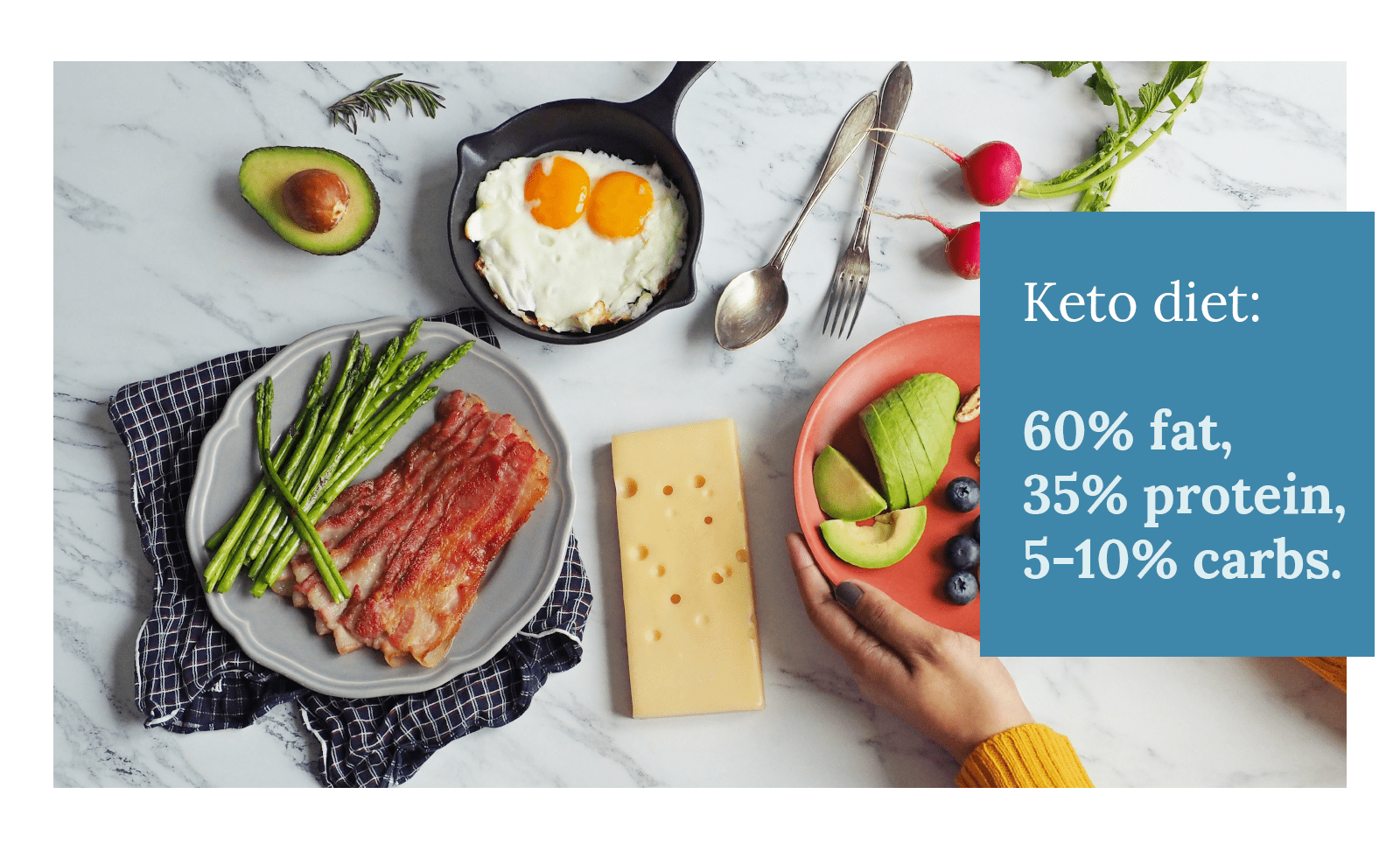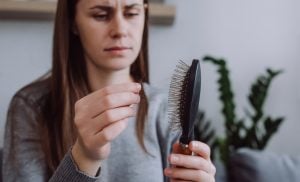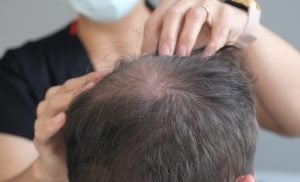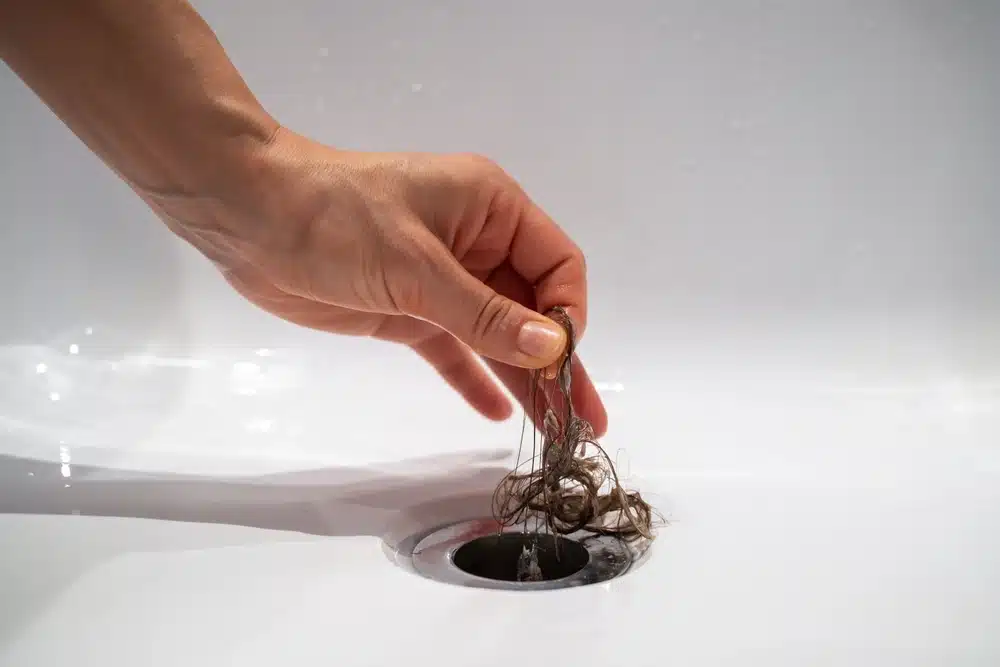Throughout history, humans have tried and tested many different diets to boost their health and lose weight. One popular diet in recent years has been the keto diet, also known as the low-carb diet. When following this restrictive diet, people have experienced positive side effects, from stronger appetite control to an increase in energy. However, like with anything, there can also be negative side effects of a low carb diet, with Keto hair loss potentially being one of them.
What is the Keto Diet?
The keto (or ketogenic) diet is a diet that involves eating high fats and low carbs. The goal is to enter the metabolic state of ketosis, when the body burns excess fat rather than carbohydrates, leading to weight loss and boosted mental clarity.
Getting into specifics, a person following a keto diet will aim for their diet to consist of 60% fat, 35% protein, and 5-10% carbohydrates. For a typical person, that might mean consuming around 30g of carbohydrates daily.
What Are the Benefits of a Keto Diet?
The keto diet has a lot of great research to back up its effectiveness. When following a ketogenic diet, you can expect the following benefits:
Weight Loss
The primary reason most people follow the keto diet is that it facilitates weight loss. With obesity leading to around a 2.8 million mortality rate each year, this benefit cannot be understated.
Better Mental Clarity
Some people say that following a keto diet can even boost their mental clarity. It’s suggested that this occurs because of the neurotoxins broken down, preventing cell loss from the brain. As such, people experienced reduced brain fog, helping them to focus on tasks easier.
Improved Acne
Many studies show that nutrition has a direct link to skin health, with one study focusing on the keto diet and acne. Results showed that – it’s true: keto can prevent acne, with many people experiencing positive effects when treating acne with the keto diet.
A Reduced Chance of Getting Certain Diseases
Following a keto diet has even been shown to reduce a person’s risk of getting certain diseases, including heart disease, some cancers, and type 2 diabetes.
It might sound too good to be true, but of course, the keto diet isn’t for everyone. Some people find it too restrictive and prefer to include more carbohydrates in their diet. Others might find that the diet causes adverse effects, with hair loss potentially being one of them.
Can a Keto Diet Cause Hair Loss?
So, the burning question: is there a link between the keto diet and hair loss? The answer is a little more complicated than a simple yes, but there are certain instances where keto can cause a person to experience hair loss. It’s important to remember that keto hair loss usually occurs when a person restricts too much while following the diet. In fact, many people following keto don’t experience losing hair of any kind. If you want to start keto and prevent hair loss at the same time, it’s important to understand exactly what causes the hair loss experienced when following the keto diet.
Extreme Weight Loss and Telogen Effluvium
Sudden, rapid weight loss can happen when following a keto diet thanks to the body burning through fat stores. While this may be seen as a positive, the stress of losing so much weight in one go can have unfortunate consequences. More specifically, telogen effluvium.
Telogen effluvium is a relatively common type of hair loss that occurs when the body goes through extreme stress, which can happen with rapid weight loss. What happens is around 70% of your hair enters the anagen stage before it typically would in your usual hair cycle, leading to hair falling out. Usually, hair loss from keto causes acute telogen effluvium, which can be resolved. Regarding diet and hair loss in females, telogen effluvium is one of the most common causes.
How Do You Know You Have Telogen Effluvium?
If you’ve lost a lot of weight and experienced hair loss, that might be telogen effluvium. Some signs include:
- Excessive hair found on brushes, pillows, and shower drain
- Shedding hair
- Thinning areas on the scalp
- An absence of scalp issues (like flaking)
See your doctor if you think you have telogen effluvium – a doctor can easily diagnose it from a simple scalp examination. Treatments may include over-the-counter (OTC) medications like Minoxidil and supplements.
The Vitamin Deficiencies that Cause Hair Loss
There are other reasons you might experience hair loss when following a keto diet – especially if you miss out on specific vitamins and minerals thanks to the restrictions. If you don’t get enough biotin, iron, vitamin C, vitamin D, and zinc, your hair won’t experience healthy growth. When following a keto diet, it’s important to ensure you get enough vitamins and minerals while restricting the kinds of foods you eat to avoid this – many keto followers take a multivitamin. Otherwise, you may experience hair loss from keto.
Is Diet-Caused Hair Loss Permanent?
No – most cases of diet-rated hair loss can be reversed. If you adjust your diet to ensure you’re getting enough calories and all the vitamins and minerals it needs for healthy hair growth, your hair should return to how it was.
Are there Other Low Carb Diet Side Effects?
Some other side effects of a low carb high protein diet include:
- Gastrointestinal issues
- Kidney stones
- Dehydration
If you want to start keto, it’s a good idea to speak with your doctor – such a big change in your diet can cause unexpected issues, from hair loss to digestive problems.
Can You Prevent Hair Loss when Following a Keto Diet?
Yes. You can definitely gain the benefits of a keto diet without losing your hair. To do so, avoid too heavy of a calorie restriction, as losing weight too quickly can lead to shock hair loss. Additionally, make sure your diet includes all the vitamins and minerals you need. Even a slight biotin deficiency may cause your hair to fall out!
Other Popular Diets that Can Cause Hair Loss
Any diet that causes rapid weight loss or leads to nutritional deficiencies can cause hair loss. Some other popular diets that may cause this include:
- Intermittent fasting
- Atkins
- Dukan diet
- Paleo diet
- Plant-based diet
It’s worth mentioning that these diets don’t necessarily lead to nutritional deficiencies or extreme weight loss. In fact, many people find that they work perfectly for their lifestyle. It’s always worth speaking with a doctor before starting a new diet like any of the above, as you want to ensure you do it right to avoid potentially harmful side effects like hair loss.
Is Keto Worth It?
The link between the keto diet and hair loss might put you off trying this way of eating, but it shouldn’t. Keto can provide a lot of great benefits, from sustainable weight loss to better brain function. As long as you get the right nutrients and calories each day, you shouldn’t experience any adverse effects.
Are There Solutions for Hair Loss?
Experiencing hair loss can really knock your confidence. If your hair loss was caused by a keto diet (or any other diet), the solution is usually to take a multivitamin or supplement. However, that’s not always the cause of hair loss – sometimes, the hair loss is more permanent. If yours isn’t linked to diet and instead is due to something like male pattern baldness or another kind of alopecia, there are other solutions, such as:
Medical Treatments
The two most popular types of medical treatments for hair loss are Minoxidil and Finasteride. Minoxidil is a topical treatment often used to treat male pattern baldness, whereas Finasteride is taken orally. Some other medical treatments can include antifungal medications and antiandrogens.
Hair Transplants
For those who want a permanent solution that provides very real results, you can get a hair transplant. The most popular hair transplant is the FUE method, which involves extracting healthy hair follicles from a donor area and then placing them into the thinning or balding section of the head. Results are at their best after twelve months and can last a lifetime.
Getting a Hair Transplant
Getting a hair transplant is an enormous step, but it could be the best solution for you. Typically, people don’t get hair transplants due to hair loss because of a nutritional deficiency, as hair tends to grow back after adjusting the diet or taking a supplement/multivitamin. However, if you’ve experienced hair loss due to ageing, a hair transplant can restore your locks to how they once were.
It’s important to be aware of the process, which is why we offer consultations with top surgeons to all who are considering this hair restoration procedure. We even offer hair transplants for things like hair scar repair, which is when healthy hair follicles are used to hide the scar tissue on the scalp. If you have any questions, our expert team is always on hand.
Sources:
- Ketogenic Diet
- Nutrition and Acne: Therapeutic Potential of Ketogenic Diets
- Study shows that keto diet boosts size and strength of aging muscles, improves brain health
- Telogen Effluvium
- 7 Keto Side Effects





